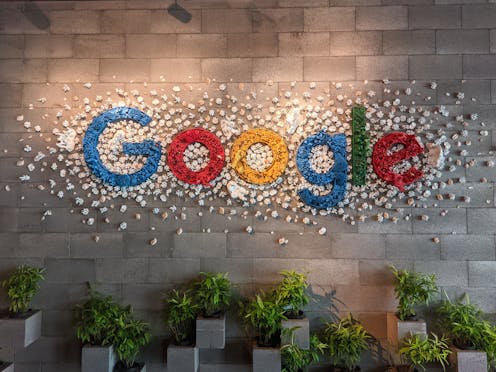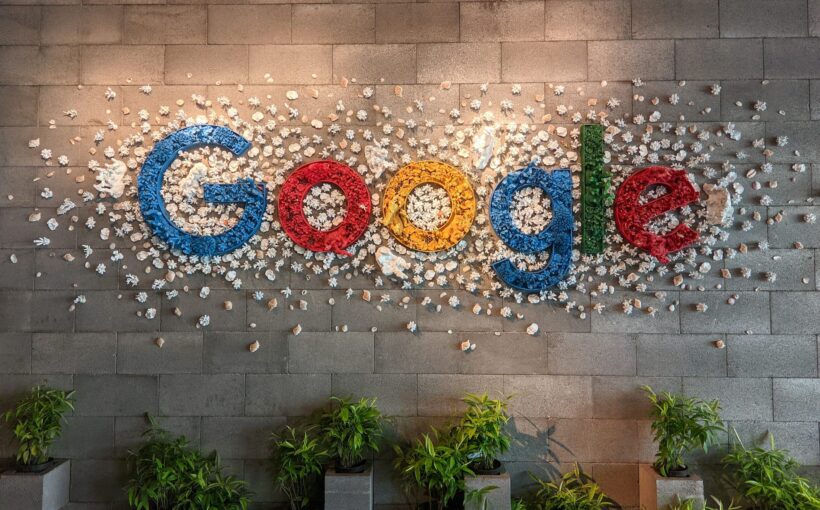
A US judge has found that Google is a monopoly and has used this dominance to reinforce its market position.
This ruling, which is subject to appeal, brings the US regulator close to the European Commission in its approach to tech giants such as Google, Meta, and Amazon. Regulators now agree that the nature of these companies’ business means that the market ends up becoming a monopoly dominated by one massive company.
It has thus become the job of the state to protect consumers from tech giants consolidating their dominance. As a company, 80% of Alphabet’s (Google’s owner) revenue, comes from advertising, a total of US$146 billion (£114 billion) in 2021. Almost everything the company does must be understood through this lens.
The main source of Google’s advertising income derives from its 90% market share of the market for general search engines, one of the oldest and most important services on the internet.
To provide users with answers ranging from the best recipe for an apple pie to a recommendation for a new vacuum cleaner, Google first gathers information about every page available on the Internet. Then, it uses its database of websites, the keywords used for search, what other people typically liked as an answer to similar queries, but also everything it knows about you, to rank possible answers.
Businesses then pay for the right for their own text to be prominently displayed alongside genuine search results. A higher quality of search results means more customers, which makes it easier to attract advertisers. It also means the advert can be tailored to consumer tastes and is therefore more valuable to advertisers.

While research has shown the actual return on investment to businesses from digital advertising is unclear, and sometimes even negative, search advertising remains in high demand. It constitutes 66% of Google’s revenue and growth in the past decade.
Other services such as Google Maps and YouTube also contribute. For a start they also generate advertising revenue. But they also provide even more information to help tailor search ads. This includes how much time a user spends on a page, what they click on, whether they react positively or negatively to a result, where they are physically and how they travelled there.
All this information about you is stored and serves a single purpose. It builds a highly detailed profile of you as a consumer that has enormous value to advertisers looking to personalise ads directly for you.
In order to gather all this valuable data, it’s vital for Google that it retains that market dominance. Google reportedly spends more than US$26 billion each year to ensure it comes up as the default search engine for the highest number of users.
Default provider
On any Android or Apple phone, the default is Google search representing a market share of 94.9%. Google is also the default on almost every web browser. And research shows that even if the cost of switching to another search engine is
small, the default position leads to a vicious circle. When consumers stick to the default, it means the possible alternative does not have enough consumer data to offer a high quality search, or to be attractive to advertisers.
Google spends US$8.4 billion a year to operate its search engine – on top of the fortune it already spends on ensuring it remains the default search engine. Today, Microsoft’s Bing is the only search engine truly competing with Google by spending billions to index the whole world wide web.
At some point, Microsoft offered to initially share 100% of its Bing revenue with Apple to secure the default instead of Google. Apple still said no: the amount was less than what Google could offer. Google is not necessarily much better as a search engine. On Microsoft Edge, the only browser where Bing comes as a default, 80% of users stick to Bing. Apple also reportedly has no interest in buying Bing from Microsoft.
Google search is simply so big and so good at making money from advertisers that it is very costly to move away from it. In many ways, the market for advertising on search engines is actually very close to legal monopolies such as water distribution or rail tracks, where the cost of setting up the infrastructure are so big that there is simply no space for more than one company.
In a statement, Kent Walker, president, Global Affairs at Google, said: “This decision recognises that Google offers the best search engine, but concludes that we shouldn’t be allowed to make it easily available. We appreciate the Court’s finding that Google is ‘the industry’s highest quality search engine, which has earned Google the trust of hundreds of millions of daily users,’ that Google ‘has long been the best search engine, particularly on mobile devices,’ ‘has continued to innovate in search’ and that ‘Apple and Mozilla occasionally assess Google’s search quality relative to its rivals and find Google’s to be superior.’
“Given this, and that people are increasingly looking for information in more and more ways, we plan to appeal. As this process continues, we will remain focused on making products that people find helpful and easy to use.”
Possible next steps
In the recent US case, the judge has not yet announced how it wants Google to stop using its monopoly.
Some rivals want to split Google’s advertising business from its search engine. Another solution would be to force Google to share the data it gathers. Doing so could improve search results for everyone.
Just like it makes little sense to have competing pipes bringing water to your home, it makes little economic sense for several firms to pay billions to gather the exact same information. This is why some groups favour having Google share its data.
Existing attempts at setting precise rules for big tech, however, sometimes have no obvious benefits for consumers. The European Commission, for instance, wanted Alphabet to stop sending Google search results about locations directly to Google Maps. But, according to one analysis, when Google removed the clickable maps from its search results, along with the Google Maps reference, there was only a modest increase in searches for other map services. Visits to Google Maps, meanwhile, changed very little.
So, despite all the legal moves to introduce more competition into this market, huge questions thus remain as to what practical steps regulators can take without making the consumer experience even worse.
![]()
Renaud Foucart does not work for, consult, own shares in or receive funding from any company or organisation that would benefit from this article, and has disclosed no relevant affiliations beyond their academic appointment.



